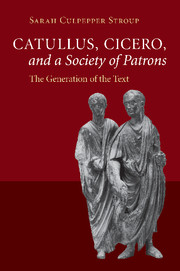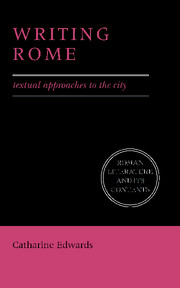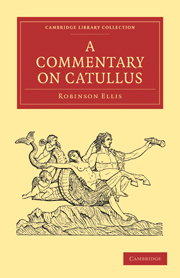Catullus, Cicero, and a Society of Patrons
This is a study of the emergence, development, and florescence of a distinctly 'late Republican' socio-textual culture as recorded in the writings of this period's two most influential authors, Catullus and Cicero. It reveals a multi-faceted textual - rather than more traditionally defined 'literary' - world that both defines the intellectual life of the late Republic, and lays the foundations for those authors of the Principate and Empire who identified this period as their literary source and inspiration. By first questioning, and then rejecting, the traditional polarisation of Catullus and Cicero, and by broadening the scope of late Republican socio-literary studies to include intersections of language, social practice, and textual materiality, this book presents a fresh picture of both the socio-textual world of the late Republic and the primary authors through whom this world would gain renown.
- Examines the complex relationship between Catullus, Cicero, and other influential authors of the late Roman Republic
- Provides a detailed philological analysis of key 'literary' words in use in the late Republic
- Includes an Appendix outlining the primary 'players' in late Republican literary and textual culture
Reviews & endorsements
'Stroup's general argument is worth following. It leads, in the second half of the book, to an ambitious presentation of a shared 'text' of intellectual life, in which literary genres, modes of expression and creative achievements were extraordinarily elevated in cultivated society. Just as importantly, these provided some of the crucial foundations and principles on which the great writers of the next generation, Horace, Virgil and Ovid, were to build.' The Times Literary Supplement
Product details
February 2015Paperback
9781107477810
324 pages
230 × 151 × 20 mm
0.5kg
Available
Table of Contents
- Introduction
- Part I. How to Write about Writing:
- 1. When? Otium as 'time to write'
- 2. What? Munus as the 'gift of duty'
- 3. Where? Libellus: polished and published
- Part II. The Textualization of Display:
- 4. The problem with liberal performance
- 5. From public display to textual display
- 6. The poetics of literary obligation
- Part III. The Materialization of the Text:
- 7. An object of Catullan affection
- 8. Brutus: the dialogic personification of the Republican voice
- Epilogue
- Appendix: what 'society of patrons?' A prosopography of the players.





